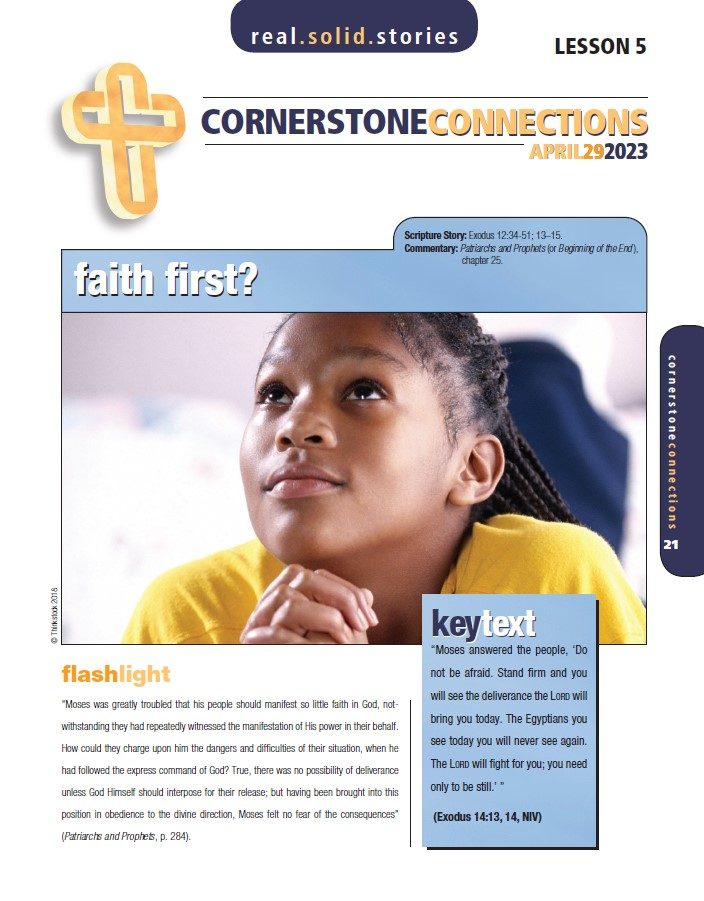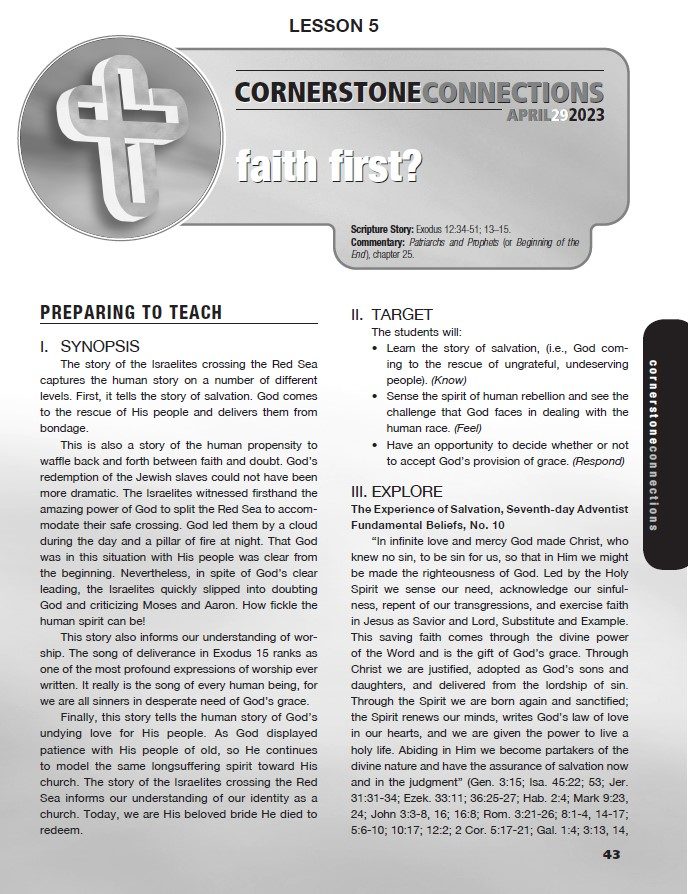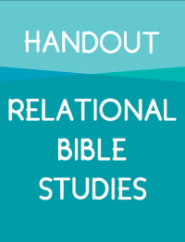“Faith First?”
Click below to download the Cornerstone Connections leader’s guide and student lesson. This week’s resources also include two lesson plans and a discussion starter video which offer different ways of looking at the topic. Each lesson plan includes opening activities, scripture passages, discussion questions, and real-life applications.
God delivers His people from bondage, but they are not sure they want to trust the Unknown for the known. God continues to try to get through to them.
SCRIPTURE PASSAGES
OVERVIEW
What does it mean to “have faith”? The Bible talks about faith hundreds of times—both about people exercising faith, and that God is faithful to His people. This week’s story is one of the Bible’s most remarkable instances of both.

OPENING ACTIVITY: OPINION POLL
Today the meaning of faith often gets a bit twisted. Share this questionnaire with your students, either digitally or on paper, then discuss their answers. (Remember that the different answers are to prompt thinking and discussion, not necessarily to provide the “correct” answer.)
DOWNLOAD THE FAITH OPINION POLL
FAITH OPINION POLL
1. When Jesus says that “faith as small as a mustard seed” is enough to move mountains (Matthew 17:20), what do you think He meant?
2. When someone is injured or gets a deadly disease and dies despite having strong faith, what do you think it means?
3. How do we know the difference between faith and our own presumption—(e.g., Satan tempting Jesus to jump from a building)?
4. What does it mean that “faith without works” is dead (James 2:17)?
5. Why does God seem to work greater miracles in some people’s lives than in others?
TRANSITION
Share a story, or invite someone to share with your class their own experience, about a time when you saw no way out of a situation without God’s dramatic intervention. Alternately, share about when you tested God’s faithfulness to you, such as by paying tithe.

BIBLE STUDY GUIDE
Exiting Egypt
Read Exodus 12:34-39.
34 So the people took their dough before the yeast was added, and carried it on their shoulders in kneading troughs wrapped in clothing. 35 The Israelites did as Moses instructed and asked the Egyptians for articles of silver and gold and for clothing. 36 The Lord had made the Egyptians favorably disposed toward the people, and they gave them what they asked for; so they plundered the Egyptians.
The Israelites journeyed from Rameses to Sukkoth. There were about six hundred thousand men on foot, besides women and children. 38 Many other people went up with them, and also large droves of livestock, both flocks and herds. 39 With the dough the Israelites had brought from Egypt, they baked loaves of unleavened bread. The dough was without yeast because they had been driven out of Egypt and did not have time to prepare food for themselves.
DISCUSSION
One Last Showdown
Read Exodus 14:5-14.
5 When the king of Egypt was told that the people had fled, Pharaoh and his officials changed their minds about them and said, “What have we done? We have let the Israelites go and have lost their services!” 6 So he had his chariot made ready and took his army with him. 7 He took six hundred of the best chariots, along with all the other chariots of Egypt, with officers over all of them. 8 The Lord hardened the heart of Pharaoh king of Egypt, so that he pursued the Israelites, who were marching out boldly. 9 The Egyptians—all Pharaoh’s horses and chariots, horsemen and troops—pursued the Israelites and overtook them as they camped by the sea near Pi Hahiroth, opposite Baal Zephon.
As Pharaoh approached, the Israelites looked up, and there were the Egyptians, marching after them. They were terrified and cried out to the Lord. 11 They said to Moses, “Was it because there were no graves in Egypt that you brought us to the desert to die? What have you done to us by bringing us out of Egypt? 12 Didn’t we say to you in Egypt, ‘Leave us alone; let us serve the Egyptians’? It would have been better for us to serve the Egyptians than to die in the desert!”
Moses answered the people, “Do not be afraid. Stand firm and you will see the deliverance the Lord will bring you today. The Egyptians you see today you will never see again. 14 The Lord will fight for you; you need only to be still.”
DISCUSSION
Wall of water
Read Exodus 14:21-29.
21 Then Moses stretched out his hand over the sea, and all that night the Lord drove the sea back with a strong east wind and turned it into dry land. The waters were divided, 22 and the Israelites went through the sea on dry ground, with a wall of water on their right and on their left.
23 The Egyptians pursued them, and all Pharaoh’s horses and chariots and horsemen followed them into the sea. 24 During the last watch of the night the Lord looked down from the pillar of fire and cloud at the Egyptian army and threw it into confusion. 25 He jammed the wheels of their chariots so that they had difficulty driving. And the Egyptians said, “Let’s get away from the Israelites! The Lord is fighting for them against Egypt.”
26 Then the Lord said to Moses, “Stretch out your hand over the sea so that the waters may flow back over the Egyptians and their chariots and horsemen.” 27 Moses stretched out his hand over the sea, and at daybreak the sea went back to its place. The Egyptians were fleeing toward it, and the Lord swept them into the sea. 28 The water flowed back and covered the chariots and horsemen—the entire army of Pharaoh that had followed the Israelites into the sea. Not one of them survived.
29 But the Israelites went through the sea on dry ground, with a wall of water on their right and on their left.
DISCUSSION
Celebration Time
Read Exodus 15:1-6.
1 Then Moses and the Israelites sang this song to the Lord:
“I will sing to the Lord,
for he is highly exalted.
Both horse and driver
he has hurled into the sea.
2 “The Lord is my strength and my defense;
he has become my salvation.
He is my God, and I will praise him,
my father’s God, and I will exalt him.
3 The Lord is a warrior;
the Lord is his name.
4 Pharaoh’s chariots and his army
he has hurled into the sea.
The best of Pharaoh’s officers
are drowned in the Red Sea.
5 The deep waters have covered them;
they sank to the depths like a stone.
6 Your right hand, Lord,
was majestic in power.
Your right hand, Lord,
shattered the enemy.
Read Exodus 15:19-21.
19 When Pharaoh’s horses, chariots and horsemen went into the sea, the Lord brought the waters of the sea back over them, but the Israelites walked through the sea on dry ground. 20 Then Miriam the prophet, Aaron’s sister, took a timbrel in her hand, and all the women followed her, with timbrels and dancing. 21 Miriam sang to them:
“Sing to the Lord,
for he is highly exalted.
“Sing to the Lord,
for he is highly exalted.
Both horse and driver
he has hurled into the sea.”
DISCUSSION
APPLICATION
Life throws struggles at us every day—most mundane, some straight-up soul-crushing. We may feel more like we’re enduring life in Egypt, with no end in sight, than that only a sea stands between us and freedom. Our faith experience may be more about endurance than taking a dramatic leap of faith. As we seek the heavenly Promised Land, consider:

SCRIPTURE PASSAGE
LEADER’S NOTE
For a Relational Bible Study (RBS) you’ll want to get into the Scripture passage and encourage the youth to imagine participating in the story while it’s happening. Then you will be able to better apply it to your own situation today.
You will need to ask God for the Holy Spirit to be present as your small group discusses the questions (no more than 3-6 people in a group is recommended). Start with the opening question. It is a personal question and the answer is unique for each individual. There is no right answer and nobody is an expert here, so don’t be surprised when you hear different responses. You are depending on the Holy Spirit to be present and to speak through your group. Say what God prompts you to say, and listen to what others share.
Take turns reading the chapter out loud. Follow that with giving the students some time to individually mark their responses to the questions (a PDF version of the handout is available as a download). This gives each person a starting point for responding when you start to share as a group. Next, begin the discussion by asking the students to share what they marked and why on each question as you work your way through. Feel free to take more time on some questions than others as discussion warrants.
Encourage each person in the group to apply what is discussed to their personal lives and to share with the group what they believe God wants them to do. Then ask them to pray that God will help each of them to follow through in doing so. Remind them to expect that God will show them ways to live out the message of this passage in the coming week, and that they are free to ask others in the group to help hold them accountable.
OVERVIEW
Here’s a background to last week’s lesson in case you weren’t involved last Sabbath. That Youth SS lesson was about the 10 plagues God sent on the Egyptians to free His people from slavery. While each plague proved to be a showdown between Yahweh and the various Egyptian gods, the final plague that resulted in the death of the firstborn male in every family neutered Pharoah by ending his dynasty (as if the destruction of Egypt from the first nine plagues wasn’t enough).
So the freed slaves left Egypt under the leadership of Moses and with the consent of Pharaoh. And the Israelites “plundered the Egyptians” as they left—payment for all those years of slave labor (Exodus 12:35-36).
Now what?
The Israelites followed Yahweh by following the cloud that led them (Exodus 13:21-22). That took them to the Red Sea. When Pharaoh and his army chased them, the Israelites had nowhere to go. This raises questions like, “Why did God set them up like this?” and “Why didn’t the Israelites trust Yahweh would deliver them from the Egyptians again, just like he had with the plagues on Egypt?” and “Why would Pharaoh chase down the very people whose god had decimated his country already?”
This sets the stage for another miracle story of the Israelites crossing the Red Sea on dry land, while Pharaoh and his army drowned and never again threatened God’s people on their way to the Promised Land.
It’s likely that many or most of the youth in your Sabbath School are familiar with this story, especially if they grew up hearing Bible stories. Encourage those who already know this story to look beyond the facts and details to the deeper questions and how this might apply to us today. By the time a person is in their teens, they can ponder “The Red Sea” as an example of impossible things they might be facing right now in their own lives.
Start with the Bible story, but move to personal applications. The Relational Bible Study makes this progression. Help your youth through this process and be sure to leave time for them to choose at least one application for their lives, starting with this Sabbath School class.
(Let’s) Get Out of Here!
When have you been someplace that you really wish you weren’t?
Read Exodus 14:5-31.
5 “This,” said the Lord, “is so that they may believe that the Lord, the God of their fathers—the God of Abraham, the God of Isaac and the God of Jacob—has appeared to you.”
6 Then the Lord said, “Put your hand inside your cloak.” So Moses put his hand into his cloak, and when he took it out, the skin was leprous—it had become as white as snow.
7 “Now put it back into your cloak,” he said. So Moses put his hand back into his cloak, and when he took it out, it was restored, like the rest of his flesh.
8 Then the Lord said, “If they do not believe you or pay attention to the first sign, they may believe the second. 9 But if they do not believe these two signs or listen to you, take some water from the Nile and pour it on the dry ground. The water you take from the river will become blood on the ground.”
10 Moses said to the Lord, “Pardon your servant, Lord. I have never been eloquent, neither in the past nor since you have spoken to your servant. I am slow of speech and tongue.”
11 The Lord said to him, “Who gave human beings their mouths? Who makes them deaf or mute? Who gives them sight or makes them blind? Is it not I, the Lord? 12 Now go; I will help you speak and will teach you what to say.”
13 But Moses said, “Pardon your servant, Lord. Please send someone else.”
14 Then the Lord’s anger burned against Moses and he said, “What about your brother, Aaron the Levite? I know he can speak well. He is already on his way to meet you, and he will be glad to see you. 15 You shall speak to him and put words in his mouth; I will help both of you speak and will teach you what to do. 16 He will speak to the people for you, and it will be as if he were your mouth and as if you were God to him. 17 But take this staff in your hand so you can perform the signs with it.”
Moses Returns to Egypt
18 Then Moses went back to Jethro his father-in-law and said to him, “Let me return to my own people in Egypt to see if any of them are still alive.”
Jethro said, “Go, and I wish you well.”
19 Now the Lord had said to Moses in Midian, “Go back to Egypt, for all those who wanted to kill you are dead.” 20 So Moses took his wife and sons, put them on a donkey and started back to Egypt. And he took the staff of God in his hand.
21 The Lord said to Moses, “When you return to Egypt, see that you perform before Pharaoh all the wonders I have given you the power to do. But I will harden his heart so that he will not let the people go. 22 Then say to Pharaoh, ‘This is what the Lord says: Israel is my firstborn son, 23 and I told you, “Let my son go, so he may worship me.” But you refused to let him go; so I will kill your firstborn son.’ ”
24 At a lodging place on the way, the Lord met Moses and was about to kill him. 25 But Zipporah took a flint knife, cut off her son’s foreskin and touched Moses’ feet with it. “Surely you are a bridegroom of blood to me,” she said. 26 So the Lord let him alone. (At that time she said “bridegroom of blood,” referring to circumcision.)
27 The Lord said to Aaron, “Go into the wilderness to meet Moses.” So he met Moses at the mountain of God and kissed him. 28 Then Moses told Aaron everything the Lord had sent him to say, and also about all the signs he had commanded him to perform.
29 Moses and Aaron brought together all the elders of the Israelites, 30 and Aaron told them everything the Lord had said to Moses. He also performed the signs before the people, 31 and they believed. And when they heard that the Lord was concerned about them and had seen their misery, they bowed down and worshiped.
1. Why did Yahweh need one more proof He was Lord of all?
2. Why did Pharaoh chase the Israelites?
3. What was the Israelite response when Pharaoh and his army closed in?
4. If you were Moses, how would you have handled this crisis?
5. What amazes you THE MOST about the Red Sea miracle?
6. What is your takeaway from this story?
7. Would you rather have been part of the Egyptians or the Israelites before the Red Sea parted? What about after the Red Sea returned to its previous state?
8. Have you ever had a “Red Sea” type of experience in your life?
SUMMARY
What a thrilling story! Once we’ve heard it once, we know how it ends, which might make it hard to remember that the Israelites didn’t know it would end this way when the Egyptians were bearing down on them. Before being too judgmental, remember they had been slaves in Egypt, and so had their parents and grandparents and . . . for hundreds of years. God’s miraculous intervention with the 10 plagues in Egypt might have been wonderfully powerful, but when they faced their next big test, their first inclination was to be afraid and forget what God could do and had done for them. But with the parting of the Red Sea, they followed God’s instruction. And the evil Pharaoh continued his demonic pursuit, failing in his attempt to vanquish Yahweh and His people. The question for us now is “What is our Red Sea experience and how will we trust God when we face that?”

APPLICATION
Bible miracles sometimes seem so distant from our reality that we treat them the same as fairytales—entertaining for young children, but not very helpful for the life of a teen. But the Bible stories are not fairytales, and they are for us today (see 1 Corinthians 10:11). Here are three potential applications for your youth to do this week. Feel free to use any one of these, adapt them, or come up with your own application in consultation with God.
The Israelites faced one impossibility after another. Being trapped at the Red Sea was one more example of this. From a human perspective, let’s admit it was impossible. But they were not limited to just human power; in fact, God led them to this very place! What are examples of things you face that, from a human perspective, are impossible? It might be recent, or from a long time ago, or maybe still in your future.
To move from the impossible to the possible and then to the probable is the kind of thing God does with us all the time.
DOWNLOAD PDF HERE
Sometimes we forget what God has done in the past. The Israelites certainly did, and so do we.
Music can help us remember things that we forget when it’s just a thought. Music anchors things more deeply.
That's The Power
A contemporary song from Hillsong Worship
I Sing the Mighty Power of God
A hymn with timeless lyrics
Pharaoh Pharaoh
A fun kids’ song that may have been popular when your parents or grandparents were young
Add your own songs!





